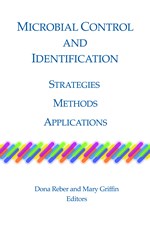Microbial Control and Identification: Strategies Methods Applications (single user digital version)
- Format
- PDF Single user
- Member Price
- $240.00
- Nonmember Price
- $299.00
- Government Price
- $240.00
Please sign in or become a member to purchase items from the PDA bookstore.
In PDA's latest release, expert microbiologists and biopharmaceutical industry leaders explore the role of microbial identification knowledge as a cornerstone in the concept of microbial and contamination control programs. This book is an excellent reference for new microbiologists and seasoned professionals alike. Each chapter illustrates how microbial control programs for facilities, equipment, and personnel can have a positive impact on products and ultimately, patients.
The three sections will focus on the following topics:
- Strategies: Regulation, regulatory expectations, and strategies for trending, risk assessments, and risk management.
- Methods: Current best practices for microorganism identification methods, both conventional and emerging rapid methods for bacteria, viruses, mycoplasma, and fungi.
- Applications: Microbiology laboratory training for identifications, use of environmental and control microorganisms, disinfectant effectiveness and best practices, and biosafety for laboratories, manufacturing facilities, and personnel.
Available to download. Prior to purchase please view the download instructions and Terms of Usage
Format: PDF (1 file 15.4 MB)
Table of Contents
Table of Contents:
Click here to download >>>Detailed Table of Contents
Section 1 - Strategies
- Regulatory and Compendial Guidance on Microbial Identification by Tony Cundell
- Microorganism Identification and Its Role in Contamination Control by Jeanne Moldenhauer
- Meaningful Contamination Control Trending in Biological Manufacturing by Ren-Yo Forng and Jeanne Mateffy
- Assessment of Microbial Impact from a Low Bioburden Perspective by Hilary Chan and Lynn Johnson
- Quality Risk Management in the Context of Viral Contamination by Consortium on Adventitious Agent Contamination in Biomanufacturing (CAACB)
- Trending of Microbiological Isolates in the Bio-Pharmaceutical Environment by Dona Reber
- Burkholderia Cepacia Complex: Characteristics, Product Risk, and Testing Assessment by Tim Sandle
Section 2 - Methodologies
- Overview of Conventional and Emerging Microbial Identification Methods by Frank E. Matos and Jennifer R. Reyes
- Qualification and Implementation of Maldi-TOF Technology for use in a Quality Control Laboratory by Jennifer R. Reyes, Frank E. Matos and Gary Kruppa
- Testing for Mycoplasma in Biotherapeutics by Houmann Dehghani and Martina Kopp
- Virus Detection and Testing Methods by Cassandra L. Braxton and Maria M. Bednar
- Data Integrity in the Laboratory by Jeanne Moldenhauer
Section 3 - Applications
- Disinfectant Performance Against Fungi, Viruses and Bacteria by James Polarine, Jr., David Shields, and Jennifer Loughman
- Environmental Isolates in Pharmaceutical Manufacturing by Angel L. Salaman-Byron
- Managing Stock Cultures by Vanessa Vasadi-Figueroa
- Competency-Based Training Approach for Microbial Identifications by Edward S. Balkovic and Gary C. du Moulin
- Mold Contamination in the Pharmaceutical Industry by Brian G. Hubka and Jeanne Moldenhauer
- Key Features of a Biosafety Program for the Biopharmaceutical Industry by Jessica Avizinis
About the Authors
About the Editors
Dona Reber has more than 25 years of academic and industrial microbiology experience, including developing and implementing contamination control strategies for aseptic/non aseptic manufacturing, microbiology testing/development, and managing/networking microbiology laboratories. She is Senior Manager of Microbiology and Aseptic Support, Global Quality Operations for Pfizer, responsible for assessing aseptic processing facilities, investigations, troubleshooting, and developing policy documents for microbiology.
Dona holds B.S. and M.S. degrees in related sciences, is (SM) NCRM certified, has been a PDA member for 20+ years, and a longtime chair of the Pharmaceutical Micro Expert Discussion Group. She has numerous publications on microbial identifications systems, environmental monitoring and microbiology risk assessments. She has co-authored three PDA Technical Reports: TR#13, Fundamentals of an Environmental Monitoring Program; TR#67, Exclusion of Objectionable Microorganisms from Non Sterile Pharmaceutical, Medical Devices and Cosmetics; and TR#70, Fundamentals of Cleaning and Disinfection. She is on a PDA Task Force for Low Bioburden Environmental Monitoring. She has participated in instructing new FDAinspectors, and is an instructor for the PDA on TR#13, Fundamentals of an EM Program. She presented at the most recent PDA Micro Conference on environmental monitoring for low bioburden processes.
Mary Griffin, Principal, MG Quality Microbiology Consulting, LLC, is a microbiologist with over 35 years of academic (University of Michigan/University of Massachusetts) and biopharmaceutical experience. She initiated and led the Quality Control Microbial Science and Technology department at Pfizer (previously Wyeth, Andover, MA) during a period of significant growth. She adapted her extensive knowledge of microorganisms and classical identification techniques to successfully implement both identification and rapid, automated detection systems to keep the facility on the cutting edge of novel technologies. She continues to support the industry as a consultant to apply her microbiological and rapid technologies expertise for microbial control. She holds a M.S. degree in Microbiology and is certified as a Specialist Microbiologist SM (NRCM). She is an active member of the Parenteral Drug Association (New England Chapter).

